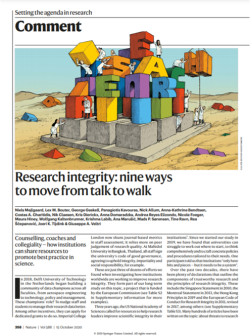
Research integrity: nine ways to move from talk to walk
How can a European mandate support organizational reform without squashing grassroots enthusiasm? By supporting choices and offering tools that individual organizations can adopt. Examples include the UK Research Integrity Office’s procedure to investigate research misconduct and the European Network of Research Integrity Offices’ recommendations for doing so.
... read more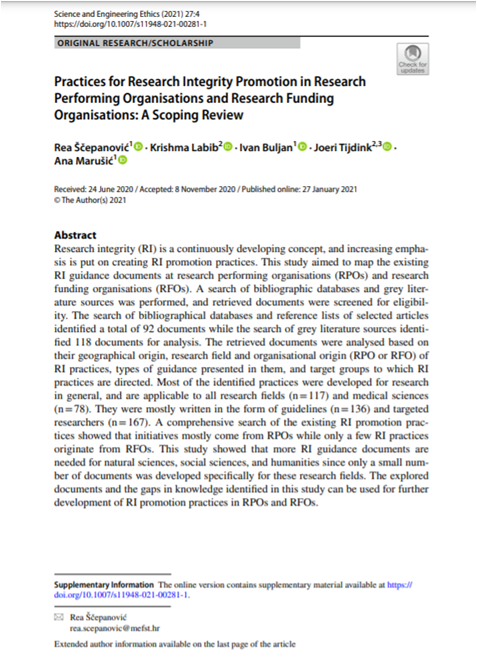
Practices for Research Integrity Promotion in Research Performing Organisations and Research Funding Organisations: A Scoping Review
A comprehensive search of the existing RI promotion practices showed that initiatives mostly come from RPOs while only a few RI practices originate from RFOs. This study showed that more RI guidance documents are needed for natural sciences, social sciences, and humanities since only a small number of documents was developed specifically for these research fields. The explored documents and the gaps in knowledge identified in this study can be used for further development of RI promotion practices in RPOs and RFOs.
... read more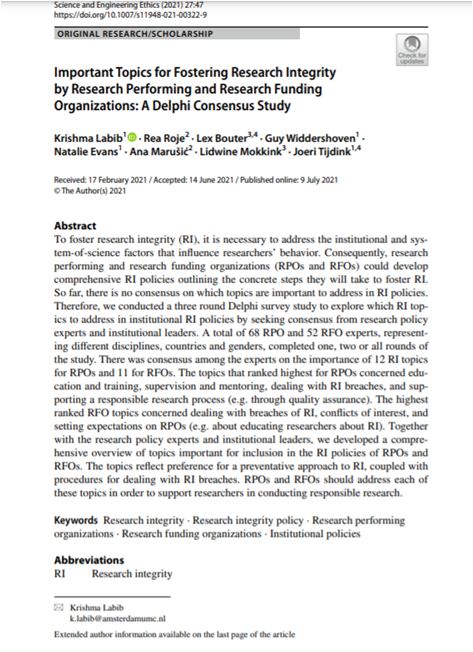
Important Topics for Fostering Research Integrity by Research Performing and Research Funding Organizations: A Delphi Consensus Study
We conducted a three round Delphi survey study to explore which RI topics to address in institutional RI policies. A total of 68 RPO and 52 RFO experts, representing different disciplines, countries and genders, completed one, two or all rounds of the study. The topics that ranked highest for RPOs concerned education and training, supervision and mentoring, dealing with RI breaches, and supporting a responsible research process (e.g. through quality assurance). The highest ranked RFO topics concerned dealing with breaches of RI, conflicts of interest, and setting expectations on RPOs (e.g. about educating researchers about RI).
... read more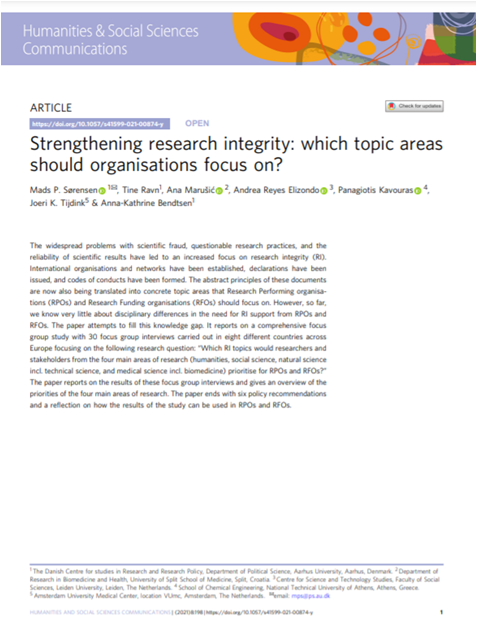
Strengthening research integrity: which topic areas should organisations focus on?
The work reports on a comprehensive focus group study with 30 focus group interviews carried out in eight different countries across Europe focusing on the following research question: “Which RI topics would researchers and stakeholders from the four main areas of research (humanities, social science, natural science incl. technical science, and medical science incl. biomedicine) prioritise for RPOs and RFOs?” The paper gives an overview of the priorities of the four main areas of research and provides six policy recommendations and a reflection on how the results of the study can be used in RPOs and RFOs.
... read more
Education and training policies for research integrity: Insights from a focus group study
We conducted thirty focus groups, engaging 147 participants in eight European countries. Using a mixed deductive-inductive thematic analysis, we identified five themes: (1) RI education should be available to all; (2) education and training approaches and goals should be tailored; (3) motivating trainees is essential; (4) both formal and informal educational formats are necessary; and (5) institutions should take into account various individual, institutional, and system-of-science factors when implementing RI education. Our findings suggest that institutions should make RI education attractive for all and tailor training to disciplinary-specific contexts.
... read more
Development and implementation of research integrity guidance documents: Explorative interviews with research integrity experts
To explore in-depth the issues related to the development and implementation of RI guidance documents and responsibilities of research organizations and other stakeholders in promoting RI and fostering the culture of RI, we conducted interviews with participants working or having experience in the RI field. Our objectives were to explore: a) the opinions about existing RI guidance documents and the potential role of SOPs for RI in research performing and funding organizations, b) the opinions on how to improve existing processes of developing and implementing RI guidance documents and practices, c) the conditions (barriers and facilitators) for effective RI implementation in different settings (research organizations, disciplinary fields, and countries), and d) novel ideas or experiences for positive changes in RI.
... read more
Factors influencing the promotion and implementation of research integrity in research performing and research funding organizations: A scoping review
To our knowledge, a comprehensive study that maps factors both positively and negatively related to research integrity promotion and implementation on different levels (individual researchers, organizational level, and the system of science), taking into account different stakeholders, geographic areas, and disciplinary fields, does not exist. This scoping review aimed to fill this gap by exploring the available knowledge on what facilitates or hinders the implementation of research integrity standards in practice, and provide a comprehensive map that can highlight the areas in which more efforts are needed for optimal implementation of research integrity standards.
... read more
Designing and implementing a research integrity promotion plan: Recommendations for research funders
We recommend that funders develop and implement a Research Integrity Promotion Plan (RIPP). This Consensus View offers a range of examples of how funders are already promoting research integrity, distills 6 core topics that funders should cover in a RIPP, and provides guidelines on how to develop and implement a RIPP. We believe that the 6 core topics we put forward will guide funders towards strengthening research integrity policy in their organization and guide the researchers and research organizations they fund.
... read more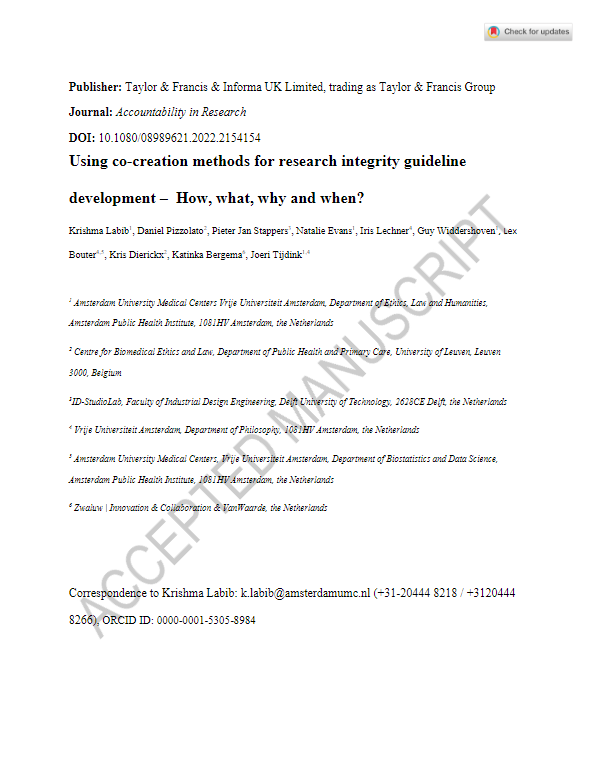
Using co-creation methods for research integrity guideline development – How, what, why and when?
Existing research integrity (RI) guideline development methods are limited in including various perspectives. While co-creation methods could help to address this, there is little information available to researchers and practitioners on how, why and when to use co-creation for developing RI guidelines, nor what the outcomes of co-creation methods are. In this paper, we aim to address this gap.
... read more